

Catenary. A hanging chain with short links forms a catenary.
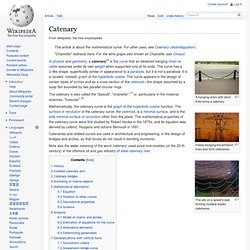
Freely-hanging transmission lines also form catenaries. The silk on a spider's web forming multiple elastic catenaries. In physics and geometry, a catenary[p] is the curve that an idealized hanging chain or cable assumes under its own weight when supported only at its ends. The curve has a U-like shape, superficially similar in appearance to a parabola, but it is not a parabola: it is a (scaled, rotated) graph of the hyperbolic cosine. Undergraduate Mathematics Majors. MCM: The Mathematical Contest in Modeling. Study Mathematics in Hungary - Budapest Semesters in Mathematics. Math in Moscow. Hertz Foundation Fellowships. What’s new. Advice. John Baez March 25, 2007 I have reached the stage where young mathematicians and physicists sometimes ask me for advice.
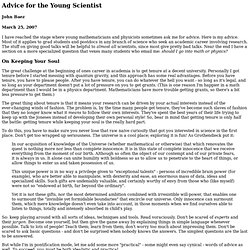
Here is my advice. Most of it applies to grad students and postdocs in any branch of science who seek an academic career involving research. The stuff on giving good talks will be helpful to almost all scientists, since most give pretty bad talks. On Keeping Your Soul The great challenge at the beginning of ones career in academia is to get tenure at a decent university.
The great thing about tenure is that it means your research can be driven by your actual interests instead of the ever-changing winds of fashion. To do this, you have to make sure you never lose that raw naive curiosity that got you interested in science in the first place. In our acquisition of knowledge of the Universe (whether mathematical or otherwise) that which renovates the quest is nothing more nor less than complete innocence. Some Practical Tips On Giving Good Talks Practice your talks! Mathematics on the Web: Books. MathWorks - MATLAB and Simulink for Technical Computing. Career Information. Center for Discrete Mathematics and Theoretical Computer Science (DIMACS) GAMS : Guide to Available Mathematical Software. Math on the Web: Mathematics by Classifications. Mathematical Awareness Month Math in the Media [Monthly magazine from the AMS] AMS Feature Column [Monthly essay from the AMS] MAA Online Columns Collection [Peterson, Devlin, Colm, Bressoud, Adams and Narayan, Sandifer, Morgan, Bogomolny, Peterson, Pegg] Frequently Asked Questions (FAQ) about Mathematics (The Sci.Math FAQ Team) Favorite Mathematical Constants , by Steven Finch; An online book and extensive collection of the author's "favorite" special numbers.
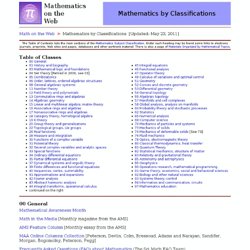
Simon Plouffe's Tables of Mathematical Constants to millions of decimal places. The Erdos Component Page at Oakland U (Rochester, MI USA) - Information on the graph of collaboration in mathematics (J. John Baez's "This week's finds in mathematical physics" Math for Poets, Understanding Mathematics, and Gödel, Escher, Bach (J. International Congress of Mathematicians -- ICM 2002 Beijing Announcements International Congress of Mathematicians -- ICM 1998 Berlin Proceedings.
Mathematics on the Web. Mathematica Online Integrator. Mathematics Archives Calculus Resources On-Line. Welcome to the Calculus Resources On-line area of the Mathematics Archives.
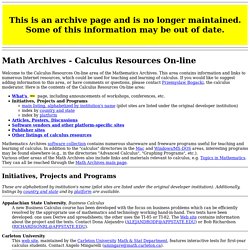
This area contains information and links to numerous Internet resources, which could be used for teaching and learning of calculus. If you would like to suggest adding information to this area, or have comments or questions, please contact Przemyslaw Bogacki, the calculus moderator. Here is the contents of the Calculus Resources On-line area: Mathematics Archives software collection contains numerous shareware and freeware programs useful for teaching and learning of calculus. In addition to the "calculus" directories in the Mac and Windows/MS-DOS areas, interesting programs may be found elsewhere (e.g., in the directories "Advanced Calculus", "Graphing Programs", etc.). Various other areas of the Math Archives also include links and materials relevant to calculus, e.g. Initiatives, Projects and Programs Appalachian State University, Business Calculus. Manifesto. Interactive Mathematics Miscellany and Puzzles. Www.divulgamat.net.
Geometric Folding Algorithms: Linkages, Origami, Polyhedra. Geometric Folding Algorithms: Linkages, Origami, Polyhedra (Fall 2010) Prof.
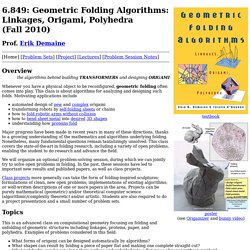
Erik Demaine [Home] [Problem Sets] [Project] [Lectures] [Problem Session Notes] Overview the algorithms behind building TRANSFORMERS and designing ORIGAMI Whenever you have a physical object to be reconfigured, geometric folding often comes into play. We will organize an optional problem-solving session, during which we can jointly try to solve open problems in folding. Class projects more generally can take the form of folding-inspired sculptures; formulations of clean, new open problems; implementations of existing algorithms; or well-written descriptions of one or more papers in the area.
Topics. JavaGami. How to Make Mobius Strip Love Hearts. Hammack Home. This book is an introduction to the standard methods of proving mathematical theorems.
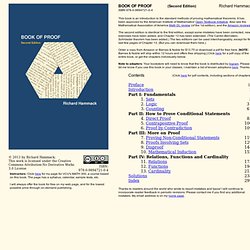
It has been approved by the American Institute of Mathematics' Open Textbook Initiative. Also see the Mathematical Association of America Math DL review (of the 1st edition), and the Amazon reviews. The second edition is identical to the first edition, except some mistakes have been corrected, new exercises have been added, and Chapter 13 has been extended. (The Cantor-Bernstein-Schröeder theorem has been added.) The two editions can be used interchangeably, except for the last few pages of Chapter 13.
Order a copy from Amazon or Barnes & Noble for $13.75 or download a pdf for free here. Part I: Fundamentals Part II: How to Prove Conditional Statements Part III: More on Proof Part IV: Relations, Functions and Cardinality.